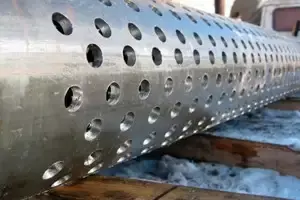
To ensure uninterrupted water supply from a well, it's crucial to not only manage its proper maintenance but also to choose the right filtering element. Perforated and slotted filters are the two most popular types used in well casings. Which one should you choose?
Perforated filters are steel pipes with holes of various diameters. Their main advantages are easy manufacturing, affordability, and high permeability. These filters are optimal for wells drilled in sandy and gravelly soils with low clay content. If your goal is high performance at minimal cost, perforated filters are a good choice.
Slotted filters are made from steel pipes with longitudinal slots cut along their length. They provide high strength, resistance to clogging, and are suitable for various types of soil—from sandy and clay to gravelly and stony. If a well is to be operated under high-load conditions and in diverse soils, slotted filters ensure reliability and longevity.
When choosing a filter for a well, several factors should be considered:
Choosing the right filter is key to the efficient and reliable operation of a well. Compare the characteristics and select the option that ensures maximum efficiency for your conditions!